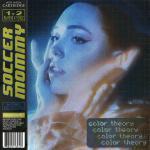-

The centerpiece of the album, yellow is the color of her eyes, explores her mother’s terminal illness through a papered-over sense of serenity. Echoing guitars sparkle like a setting sun over a beach, with little touches percolating throughout the song. But the calm that Allison creates is one of resignation, rather than peace or acceptance. “Loving you isn't enough/You'll still be deep in the ground when it's done,” she sings, a devastating line that will reverberate in the bones of anyone who’s lost somebody. As the song ends, the guitar devolves into distortion, the calm slipping into chaos.
-

All of Burial’s sonic trademarks are accounted for here (skip-and-swing beats, subterranean bass, evocative vocal samples, and, of course, vinyl crackle), with simultaneous acknowledgment of the shifts in his sound—which really began in 2012 with the release of Kindred. That three-track EP saw Burial come into impressive form compositionally, as he stretched out the once relatively standard runtime of his tracks to the ten-minute-plus mark. This paid dividends, allowing him to add dynamic shifts in tone, texture, and tension between passages within the same song. And from there on out, on a semi-yearly basis, he kept treating us to high-stakes music via low-stakes formats.
-

Part of this broadening of the palette is likely to be due to the experiences that have shaped twigs’ life since the release of LP1 five years ago. As well as medical trauma, she’s spoken out about being pigeonholed as an R&B artist purely because she’s a woman of colour (a ludicrous assertion given her work owes more to Björk than Beyoncé), and suffered racist abuse and media scrutiny thanks to a relationship with actor Robert Pattinson. Whilst it’s not explicitly clear that he’s written about on the record, it’s tempting to conclude that cellophane in particular, with its closing couplet of “They’re hating, they’re waiting / And hoping I’m not enough” is related to the experience of their partnership.
-

The result is an album of uncompromising vulnerability and rawness. Even Jogging, a song that begins with a heavy metal riff promising defiance or anger, instead opens with the line, “Recently I've been struggling with anxiety.” Dawson himself has clarified, “I certainly think it’s the saddest record I've written. I found it too much making it actually. I was really overwhelmed by it.” The most emotionally ravaging song on 2020, Fulfilment Centre, is also its longest track. Made up of stretches of gentle pop music which are intruded on by a dissonant, pointillist Sufi swirl of guitar and drums, Dawson evokes the drudgery of people working in an Amazon warehouse. Robotic voices chatter commands about “productivity” in the background, while the song's subjects are revealed to be increasingly bleak, despondent, and broken. The chorus says it all: “There's nothing left of me by the time I shuffle homeward on the early morning train. To eat a little breakfast and sleep a while, before it starts again.” The end of that song adds another verse to the chorus, but I won't print that here. Experience it for yourself.
-

As powerful as these songs are, there is no denying that some of Two Hands' most effective moments are those that cut close. Given the rapt attention and imagination that U.F.O.F. commanded, you almost feel guilty relishing some of the more direct pleasures displayed here. The title track is a cousin to Cattails from the prior album, sharing a similar percussive style. But while Cattails swayed on the hazy horizon, Two Hands is right in the room with you. Maybe the softer songs of the prior album prove superior to those here, but when any push of force is put into motion the sturdiest songs here are undeniable, as is the case here.
-

In a way, Howard's approach—leaning on what she knows best before then exploring—isn’t different from the way most solo debuts go. What’s notable here is that everything that should be a risk is pulled off without missing a step. The process of writing this album was personal and intimate, but the end result is a confident, bold debut. Whether this record means that Howard will be ready to go out on her own permanently, or ready to return to Alabama Shakes, is unclear—maybe it’ll just be something else new. She might even get around to that memoir, but you get the sense the best could still be to come.
-

For an album literally breaking her own boundaries and those of conventional pop albums for that matter, the choice to work with a renowned pop producer like Jack Antonoff might seem a little strange, but, in the end, it turns out to be a fruitful collaboration. The sound is spacious and elegant, at times stripped to its most essential parts, and other times it's completely indulgent and expansive. Venice Bitch is the best example of this: A nine-minute pop song that builds from gently plucked acoustic guitars to a long instrumental passage of surging guitars that give way to squiggly synths and psychedelic soloing with Del Rey's voice harmonizing from a distance before everything comes crashing back in and comes to an appropriately dramatic conclusion.
-

Something to Do is the one single on Memory that is emblematic to the Vivian Girls of yore, so it made sense to release it early—most likely to reintroduce those who may have forgotten their undying affection for both love and reverb. It's a healthy way to start with a clean slate, but there's nothing simplistic about how these songs manage to sound so robust—even when they sound hazy and dreamlike. Mistake is mesmerizing, a reflection on missing someone that gradually coddles you with a radiant strum, later to rattle you to your core. The multi-part scorcher of All Your Promises provides a similar effect, the album's emotional centerpiece, a brooding lament on lost love that holds its tension throughout its grand, blazing soundscape. The trio has experimented with longer songs before, but never have they sounded this dynamic—controlling the song's mercurial flow with taut efficiency.
-

Giannascoli stacks many of his most accessible tracks early on, some of which are career highlights. Hope is a devastating recount on how he lost his friend to synthetic opioids—and yet he keeps the rhythm upbeat, maintaining a straightforward acoustic strum that follows his bittersweet vocal melody. The striding Southern Sky is the album's "Elliott Smith" moment, in the best sense of the term, a twangy waltz with a beautiful violin lead (courtesy of frequent collaborator Molly Germer) that oscillates around guest singer Emily Yacina's mellifluous delivery. There's a lot of variation from track to track, but Giannascoli applies a steady atmosphere to his well-structured arrangements without drifting off into the distance.
-

The album follows a narrative path, but so does each song. Rather than adhere to a particular formula, tracks ramble along, following imagery or emotional threads, but almost never adhering to a verse-chorus-verse pattern. You might feel like Callahan's making it all up as he goes along, and we're all getting stoned together and having those kinds of dream-conversations that last all night—but that's just because Callahan's craftspersonship makes these songs seem laid back and easy, when realistically, only a lifetime of wisdom and hard work yields music so engaging and vibrant.










